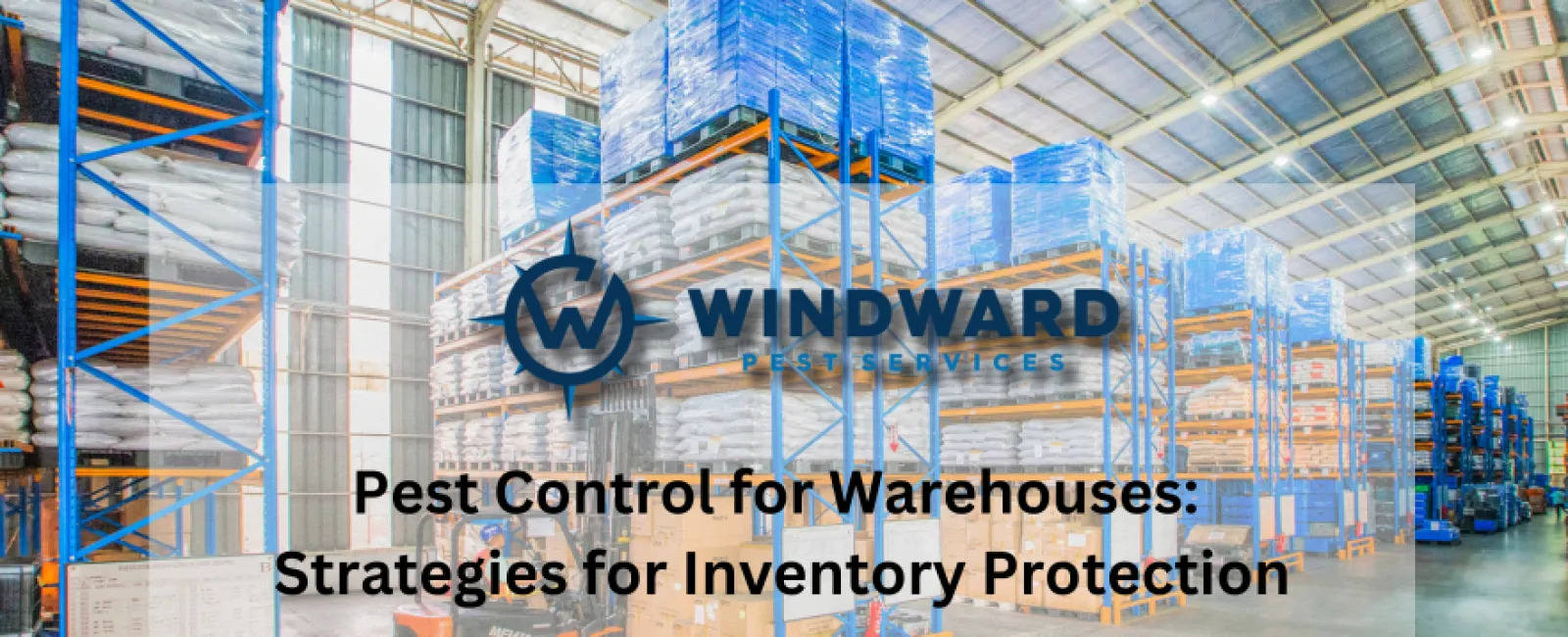Warehouses play a vital role in the supply chain, but their large open spaces, constant movement of goods, and easy access points make them prime targets for pest infestations. Left unchecked, pests can cause significant damage to your inventory, compromise the structure of the building, and pose health risks to employees. Fortunately, Windward Pest Services offers comprehensive solutions to manage and prevent infestations in warehouse environments, helping you safeguard your assets and maintain a pest-free operation.
In this article, we'll discuss the common pests that invade warehouses, why these environments are vulnerable, and how Windward Pest Services can assist with prevention and control through expert Atlanta pest control and Atlanta interior and exterior pest treatments.
Common Warehouse Pests
Warehouses are susceptible to a wide variety of pests, each presenting unique challenges. Some of the most common invaders include:
Rodents (Rats and Mice): Rodents are notorious for infiltrating warehouses, especially those that store food. They gnaw through packaging, contaminate products, and can cause electrical damage by chewing on wiring. Additionally, their droppings spread disease, making them a serious threat to your employees' health and warehouse sanitation.
Insects (Cockroaches, Ants, Beetles): Insect infestations are also common in warehouses. Cockroaches are particularly drawn to areas with moisture and food residue, while ants can infiltrate storage areas and contaminate products. Beetles, especially those that feed on grains and stored products, can cause significant damage if not quickly addressed.
Birds: Birds like pigeons and sparrows can enter through open doors or damaged roofing. Their nests, droppings, and feathers can damage stored goods and create health hazards. Additionally, bird infestations can clog ventilation systems, adding to operational costs and risks.
Termites: Though less common, termites can cause devastating damage to warehouses with wooden structures. If your warehouse uses wooden pallets or has a wooden framework, termites can quickly compromise the building's structural integrity, making early detection critical.
Flies: Flies are especially problematic in warehouses that store food or organic materials. They are attracted to decaying matter and can spread harmful bacteria, posing a significant health risk to employees and contaminating food products.
Why Warehouses Are Vulnerable to Pests
Several factors make warehouses an attractive target for pests:
Large, Open Spaces: The sheer size of a warehouse makes it difficult to monitor every area for pest activity. Pests can find hiding spots in hard-to-reach corners and go unnoticed until the infestation is severe.
Constant Movement of Goods: With goods constantly being moved in and out, pests can easily hitch a ride on shipments or enter through open doors. This makes it challenging to maintain a completely pest-free environment without proactive measures.
Multiple Access Points: Warehouses typically have several entry points, including loading docks, windows, and vents. These can provide easy access for pests if not properly sealed and monitored.
Availability of Food and Water: Many warehouses store food products or materials that attract pests. In addition, leaks, spills, and standing water can provide a steady supply of moisture, drawing pests like cockroaches, ants, and rodents inside.
Clutter and Storage: The amount of inventory in warehouses offers numerous hiding spots for pests. Poorly organized or cluttered storage areas can make it difficult to detect and eliminate pests.
Preventing Pest Infestations in Warehouses
Preventing pest infestations in your warehouse requires a combination of proactive measures and professional pest control services. Here are some key strategies to keep your facility pest-free:
Regular Inspections: Scheduling routine Windward Pest Services pest inspections is crucial for identifying potential pest issues before they become major problems. Inspect the building's interior and exterior for signs of pest activity, such as droppings, gnaw marks, or damaged goods.
Sealing Entry Points: Ensure that all doors, windows, vents, and other access points are properly sealed to prevent pests from entering. Use weatherstripping, door sweeps, and mesh screens to block potential entry points.
Sanitation Practices: Maintaining a clean warehouse environment is one of the most effective ways to deter pests. Clean up spills immediately, dispose of trash regularly, and store food products in sealed containers to eliminate attractants.
Moisture Control: Address any leaks or areas of standing water that may attract pests. Repair plumbing issues and ensure proper ventilation to reduce humidity levels, which can help deter cockroaches and other pests.
Organized Storage: Keep inventory organized and store goods off the floor and away from walls to make it more difficult for pests to hide. Rotate stock frequently and avoid overcrowding shelves, which can create additional breeding grounds for pests.
Monitor Shipments: Pests often enter warehouses through incoming shipments. Inspect goods, pallets, and packaging materials for signs of pest activity before bringing them inside.
The Role of Windward Pest Services in Warehouse Pest Control
While preventive measures are essential, professional pest control services are critical for long-term pest management. Windward Pest Services provides tailored solutions for warehouses, including:
Integrated Pest Management (IPM): IPM is a comprehensive approach that combines preventive strategies, monitoring, and targeted treatments. Windward Pest Services focuses on identifying the root causes of infestations and using minimal chemical treatments, making it an environmentally friendly solution for warehouse pest control.
Rodent Control: For warehouses facing rodent infestations, Windward Pest Services offers a range of treatments, including trapping, baiting, and exclusion techniques. We can help you seal off entry points and implement rodent-proofing measures to prevent future infestations.
Insect Control: Insect infestations, particularly from cockroaches, ants, and beetles, require professional intervention. Atlanta interior and exterior pest treatments provided by Windward Pest Services target these pests effectively while minimizing the impact on your warehouse operations.
Bird Control: For warehouses affected by bird infestations, Windward Pest Services can install exclusion devices, netting, and other deterrents to keep birds from nesting and roosting in your facility, protecting your goods and equipment.
Ongoing Monitoring: Pest control is not a one-time solution. Windward Pest Services can set up monitoring stations throughout your warehouse to detect early signs of pest activity, allowing for swift intervention before an infestation can spread.
Effective pest control is essential for maintaining a clean, safe, and efficient warehouse. By partnering with Windward Pest Services, you can protect your inventory, safeguard your facility, and prevent costly pest infestations. Regular Windward Pest Services pest inspections, along with Atlanta pest control services, are key to keeping pests at bay.
Whether you're dealing with rodents, insects, or birds, proactive pest management is the key to avoiding infestations and ensuring the smooth operation of your warehouse. Take action today with Windward Pest Services to protect your business from the wide range of Georgia pests that threaten your facility.

